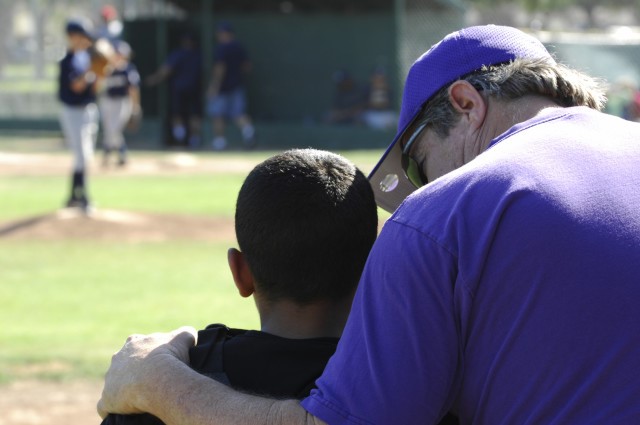Older brothers become heroes and role models whether you want them to or not. It’s not a choice you make. You don’t wake up one morning and say, “Hey, my big brother is a cool guy, I’m gonna be just like him!” Nope. Like that funky, strange smelling corduroy coat, it’s just one more hand-me-down.
My older brother was a nice guy and a good athlete. He excelled in sports, setting records in track and football without flexing a hubris muscle… he simply refused to be impressed with himself. Dave was the quintessential sandbagger; he would never brag about his accomplishments—athleticism came as naturally as breathing and sleeping.
It was fun being his little brother…that is, until he graduated high school, leaving behind his sports legacy. I took it for granted that I, too, was a natural athlete. In my mind I was just as fast and just as agile as Dave. What did I know about giftedness? I assumed athleticism was an inherited gene. I was more than merely hopeful; I was convinced! These factors, combined with an overactive imagination, kept reality at an arm’s length.
Unfortunately, that responsibility fell upon the coach following each try-out. First, it was the football coach, who  with an arm draped over my three-sizes-too-large shoulder pads, said, “Okay, Grubby, I don’t think football is your sport… but, hey, maybe it’s basketball!” Then, four months later it was the JV basketball coach, “Grubb, I’m sorry we don’t have a spot for you this year, but you know, maybe you can play baseball this spring.” Come spring, the baseball coach, who was also my Phys. Ed teacher and already aware of my athletic inability, draped his arm over my shoulder in an eerily familiar jester and quietly offered, “I’m pretty sure I have my roster filled for this season, sorry…”
with an arm draped over my three-sizes-too-large shoulder pads, said, “Okay, Grubby, I don’t think football is your sport… but, hey, maybe it’s basketball!” Then, four months later it was the JV basketball coach, “Grubb, I’m sorry we don’t have a spot for you this year, but you know, maybe you can play baseball this spring.” Come spring, the baseball coach, who was also my Phys. Ed teacher and already aware of my athletic inability, draped his arm over my shoulder in an eerily familiar jester and quietly offered, “I’m pretty sure I have my roster filled for this season, sorry…”
Forgive me if I paint with too broad a brush here, but as I recall, coaches in the 1950 and 60’s were more Drill Sargent than Guidance Counselor. “Good coaching” included regular doses of butt-kicking and blue language—which we all know today to be outrageous behavior. So looking back I feel honored that these larger than life men took a moment to cut me loose without cutting me down. Even if it was out of respect to my brother, I felt special.
I had a great childhood—great parents, and a good home. Come to think of it, the only thing I’ve been deprived of is someone other than myself to blame for a bad day. That’s probably why I’m always amazed when I hear stories of people who’ve endured relational train wrecks and survived to help others.
As a pastor, I too often encounter broken homes and broken families. But I’m amazed to find the human spirit has an incredible ability to catch a curve ball with soft hands (something I could never do in real life). I’ve discovered what I call “Grand Canyon People”—people who survive to become inspiring monuments for others even though the river of life has carved a crooked path through their heart. Like tourists, we stand on the rim of their lives and gaze in amazement at the way they have parlayed unspeakable hurt into strength that enables them to help others with similar problems.
It occurs to me that God is like my high school coaches. Even when the news is bad, He’s still good. God isn’t the reason we receive bad news. Rather, He desires that we allow Him to equip us through those difficulties so that in turn we might become an encouragement to others in similar circumstances.
The Apostle Paul, God’s premier ghost writer says,
“God of all healing counsel! He comes alongside us when we go through hard times, and before you know it, he brings us alongside someone else who is going through hard times so that we can be there for that person just as God was there for us.”
2 Corinthians 1:3-4
Consider how your tough times may equip you to help others… and the next time you walk with a troubled friend, drape your arm over their shoulder.
